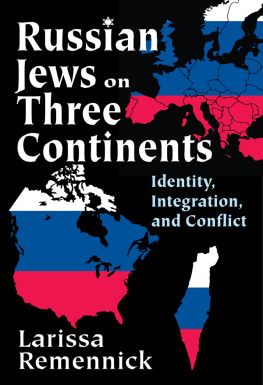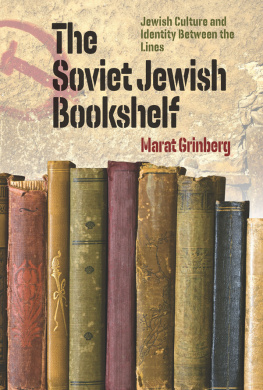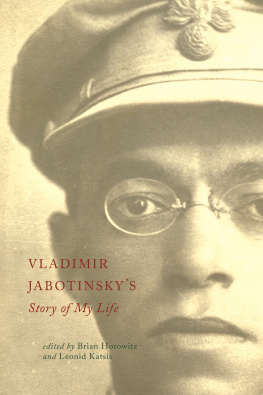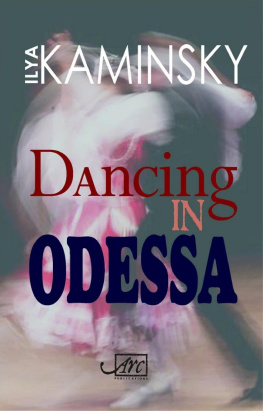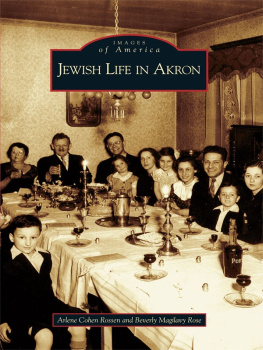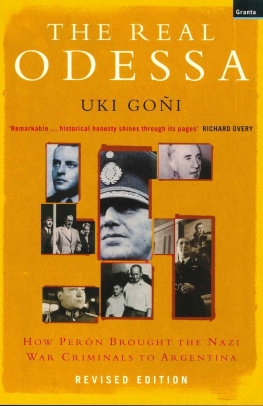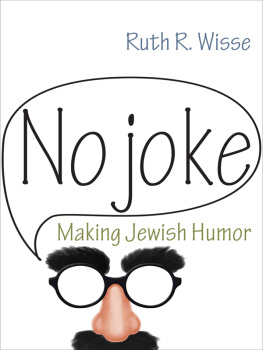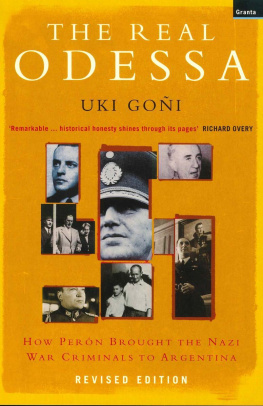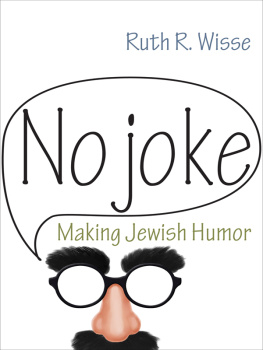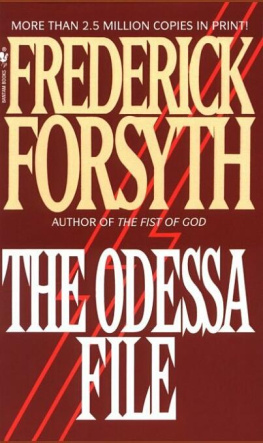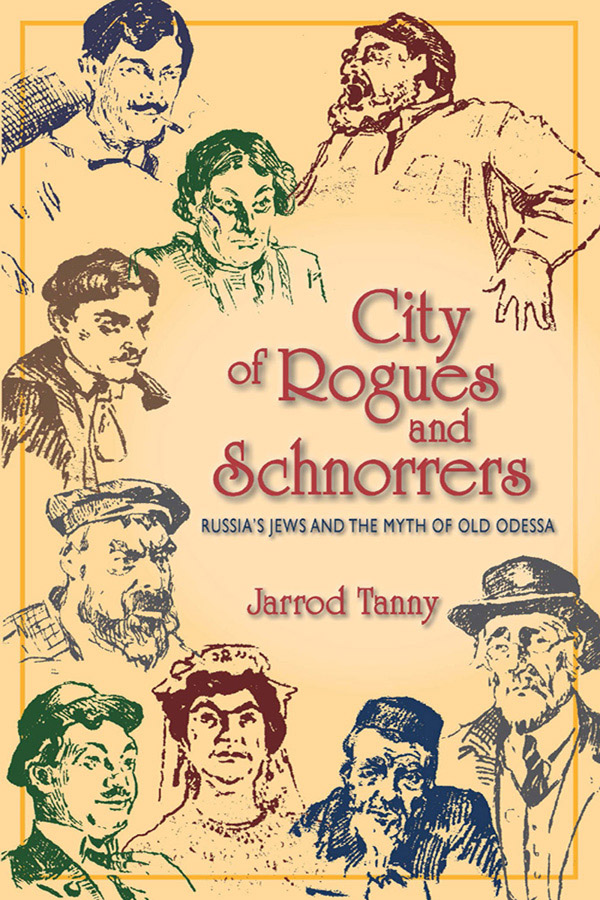ACKNOWLEDGMENTS
Lest you tire of reading this book before reaching the end of these acknowledgments, I would like to thank the most important people first. My wife, Allison Rosen, who has supported me emotionally, intellectually, and in every other way possible through the many, many years of graduate school at University of California, Berkeley, my two-year postdoctoral stint at Ohio University, and now in my new home, the history department at the University of North Carolina, Wilmington. Of no less significance are our twin children, Max and Sarah, who have yet to read this book in its entirety, even though I have read their collected works on Elmos escapades from cover to cover.
I have accumulated many intellectual debts over the years, scholars who have shaped my thinking and stimulated my mind. Yuri Slezkine embodies everything one could want in a mentorintelligence, open-mindedness, an unrivaled understanding of history, and exceptional translation skills for cryptic Judeo-Odessan criminal slang. At various stages of writing, I received invaluable feedback and advice from John Efron, Victoria Frede, Eric Naiman, Peggy Anderson, and Ned Walker. Reggie Zelnik exerted a profound influence on my scholarship, and his tragic death in 2004 meant the loss of a teacher, a friend, and a family member.
Numerous other friends and colleagues have helped me in countless ways with this project at various stages. Eleonor Gilburd, Elena Shulman, and Victoria Smolkintwo authentic Odessans and one Odessan in spiritwere always there to help me with convoluted Russian translations whenever my dictionary (surprisingly often) failed me. David Shneer has similarly bailed me out of innumerable thorny Yiddish-related problems. Eugene Avrutin, Stephen Brain, Nicole Eaton, Olga Gershenson, David Shneer, Christine Evans, and Greg Thomas each read and commented on specific portions of this book. My best friend Billy Druker, whom I have known since the Brezhnev era, has been incessantly hearing about this project from its very inception, and was even kind enough to read some of it.
I could never have become a specialist on Odessa were it not for Patricia Herlihy and Roshanna Sylvester. Through their own scholarship, their constant advice, and their help in getting me indispensable contacts in Odessa, my research trip was a smashing success, and I was able to briefly transform myself from a Montrealer into an Odessit and thus get the most out of my time in Russias (now Ukraines) Eldorado.
In 2005 Odessa was my home away from home. This would not have been possible without the kindness of Tat'iana Khersonskaia who opened up her humble apartment to me, and always insured that I had a warm place to sleep and a bublik for breakfast, even if she could guarantee neither a stable water supply nor electricity. A successful research trip would have been impossible without the immeasurable help of Ana Misiuk, Alena Iavorskaia, Elena Karakina, Liliana Belousova, and Mikhail Rashkovetskii. They facilitated my acquisition of material by providing me with advice, contacts, and resources; they opened doors and cleared the many passageways obstructed by post-Soviet bureaucracy. I also thank Michael and Mary Katz, whose trip to Odessa coincided with mine. They provided me with great company and an occasional much-needed refuge from the libraries, archives, and power outages of Odessa.
Between 2008 and 2010 Ohio Universitys history department served as my second home. My fellow faculty members in history and Jewish studies welcomed me with open arms, providing a most hospitable work environment. In particular, I would like to thank Norman Goda, Patrick Barr-Melej, Marvin Fletcher, Patricia Weitsman, and Danielle Leshaw. Without their tireless support, I could never have managed Ohio Universitys nascent Jewish studies program while devoting the necessary time and energy to my own research. Living across the street from Gillian Berchowitz proved to be a blessing in more ways than one.
In 2010 I moved the gantseh meshpuchah eastward once again, this time to the Carolinas, where I assumed an endowed professorship in Jewish history at the University of North Carolina (UNCW), Wilmington. In the brief time Ive been here, my new colleagues and their families have gone out of their way to help four displaced Canadians acclimate to Dixieland. Paul Townend, Michael Seidman, Lisa Pollard, Sue McCaffray, and Mark Spaulding, in particular, have given me their time, advice, and resources to complete this project and get on with the serious business of building up Jewish Studies at UNCW.
It has been an absolute pleasure to work with Indiana University Press. Janet Rabinowitch and Angela Burton have gone beyond the call of duty in guiding me through the process of transforming a manuscript into a monograph. My anonymous peer reviewers prudently compelled me to take a step back and rethink my projects intent, while drawing my attention to the ambiguities and inconsistencies that seemed to undermine my thesis. While I write these words, my meticulous copy editor Rita Bernhard is returning dozens of frantic emails from me, as we work together in refining my prose, eliminating far too many typos, and sorting out the frustrating array of diacritical marks from far too many alphabets.
Portions of chapters 3 and 4 were previously published as Kvetching and Carousing under Communism: Old Odessa as the Soviet Unions Jewish City of Sin in East European Jewish Affairs 39, no. 3 (December 2009). I am grateful to Taylor & Francis Ltd., http://www.informaworld.com, for permission to reprint these segments.
Finally, I thank my parents Laurence and Rosalie Tanny for always supporting me in every way possible; Cordell Tanny for being a great brother and uncle; my in-laws Joel and Julie Rosen for allowing their daughter to move far, far away from home; and my grandparents Professor Edward and Sarah Rosenthall, and Phil and Phyllis Tanny.
BIBLIOGRAPHY
ARCHIVAL SOURCES
GAOO (Gosudarstvennyi arkhiv odesskoi oblasti)
Fond 13. Starshii inspektor po nadzoru za zavedeniiami pechati i knizhnoi torgovleiu v Odesse, ed. khr. 693, 18861917 gg.
Fond 314. Kantseliariia odesskogo politsmeistera, ed. khr. 464, 18131919 gg.
Fond 635. Odesskii okruzhnoi sud, ed. khr. 469, 18701919 gg.
Fond R-1522. Odesskii gubernskii sud (gubsud), ed. khr. 2732, 19231925 gg.
Fond R-1774. Odesskii gubernskii revoliutsionnyi tribunal (gubrevtribunal) ed. khr. 6895, 19201923 gg.
Fond R-2138. Odesskoe okruzhnoe upravleniie sovetskoi raboche-krestianskoi militsii, 19231930 gg.
NEWSPAPERS AND PERIODICALS
Akh Odessa!
Bolshevitskoe znamia (Odessa)
Edges of Odessa
Krokodil (Moscow)
Krokodil (Odessa)
Moriak (Odessa)
Odesskaia pochta
Odesskii kommunist
Odesskii vestnik
Oktiabr
Pero v spinu (Odessa)
Shkval (Odessa)
Vecherniaia Odessa
Vechernie izvestiia (Odessa)
Za proletarskuiu muzyku
Zhizn iskusstva
Znamia kommunizma (Odessa)
BOOKS, ARTICLES, AND DISSERTATIONS
Abramovich, S. Y. Ale verk fun Mendele Mokher-Sforim. Vol. 7, Fishke der krumer: a mayse fun yidishe oreme layt. New York: Hibru, 1920.
. Selected Works of Mendele Moykher Sforim. Edited by Marvin Zukerman, Gerald Stillman, and Marion Herbst. Malibu: Pangloss, 1991.


